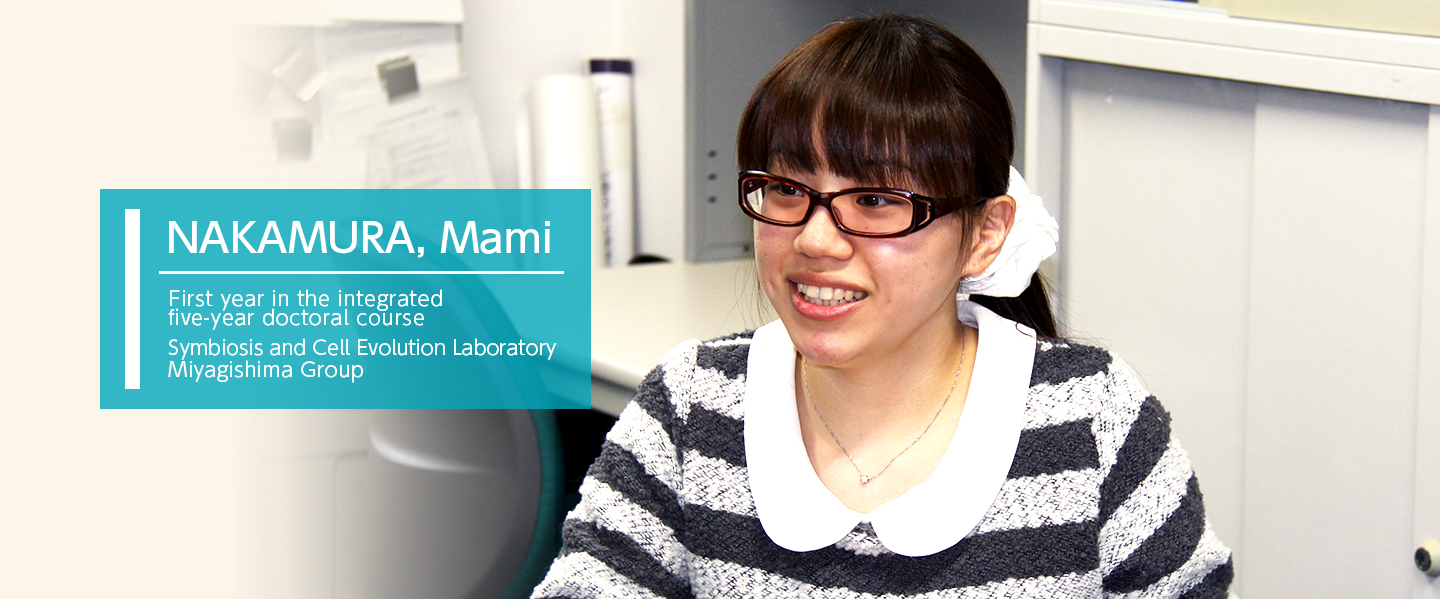Symbiosis and Cell Evolution Laboratory, Miyagishima Group NAKAMURA, Mami

- What is your research theme?
- I’m studying the relationship between photosynthesis and oxidative stress by using a unicellular red alga. I’ve been working on this theme since my final undergraduate year. Oxygenic photosynthesis converts light energy to reducing power and ATP, which support the cell growth and division of photosynthetic eukaryotes. But photosynthesis generates reactive oxygen species (ROS), which damage cellular biomolecules by oxidation. Usually, these ROS are immediately removed by scavenging enzymes. In nature, the light condition changes very often. Under high light condition, the high level of ROS is produced. In my research, I’m studying how the host cell-cycle progression depends on photosynthesis while coping with the photosynthetic oxidative stress.
- How did you learn about NIG?
- I did an online search using keywords related to the research I wanted to do, such as “algae” and “oxidative stress.” I perused the websites of all the laboratories that resulted from the search. I found my laboratory this way. I then discovered that this laboratory was at the National Institute of Genetics. For me, it was a pleasant surprise that a research institution like NIG was accepting graduate students into its laboratories. I read further and learned about a free bus tour for prospective students. I said to myself, “How can I pass up such an opportunity?” and immediately signed up. I told my supervisor that I was going to visit this laboratory at NIG, and he said, “Ah, I know somebody there.” It’s a small world, after all (laughs).
- How was the bus tour?
- I was very grateful that they took us there, because going to NIG from my university would not have been easy. On the bus, there were SOKENDAI students welcoming us. It was great to be able to directly talk with them and casually ask questions. The bus tour was a great opportunity to obtain information from scientists of various fields and generations.
- What made you choose NIG?
- I thought that NIG would be the best place for my training since NIG, as a research institution, has many research scientists and great future potential. I felt that there were perhaps not as many students as I wanted them to be, but I thought I could still try doing my best.
- How do you like it here, now that you’re admitted?
- I appreciate the fact that we can learn from professors and older students who represent a wide range of disciplines and have different viewpoints. For our research, we students can have several advisors, in addition to our supervisor from the laboratory. I can go to any one of them and say, “I am currently having such and such a problem; do you have any good suggestion about it?” Then, I can get advice. There are regular parties where the whole of NIG get together, and so opportunities for new encounters are everywhere. I really appreciate this environment. When I was an undergrad, I associated almost exclusively with other students. Now, I’m more open and talk with professors and postdoctoral researchers as well. This is one change that’s happened since I have come here.
- Do you go out with other students?
- Yes, but it’s a little complicated with students from other laboratories, which use different animals. For example, students in labs using mice, which are nocturnal, often do experiments during the night. So with them, we try to plan ahead and harmonize experiments with our social calendar.
- What would you like to do in the future?
- At the moment, I’m really enjoying my research, doing things that I couldn’t do as an undergrad and discovering new things here and there. I wish to continue my research like this and take it to higher levels in this five-year program. After that, I don’t know yet whether I want to work in an academic or private sector. But I’d be happy if I could continue doing research, whether in a corporate research center or in an academic establishment. I think that’s one thing I can do if I manage to complete the five-year program with good results. Since it’s rare that research progresses smoothly, I often get depressed. Still, I continue doing my best, thinking that failures are also necessary steps to move forward.
- Message for students considering NIG/SOKENDAI
- Do research on the Internet and in many other ways and talk to people about what interests you. Make use of information meetings and similar opportunities to see for yourself, with your own eyes, and listen with your own ears. It is especially important to carefully think to determine what is best for you when you are planning further studies. Some websites are not updated for some time. When you actually visit a graduate school or a laboratory, you might find their research quite different from what they say on the Internet. I urge you to personally visit laboratories that interest you, meet and talk with their members, and choose where you want to go.
Back
















